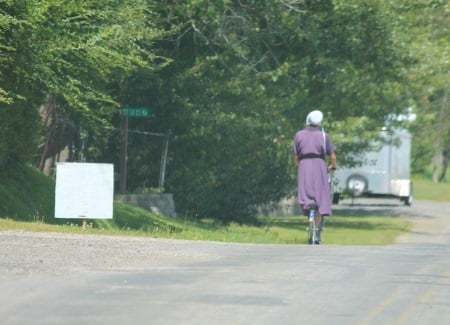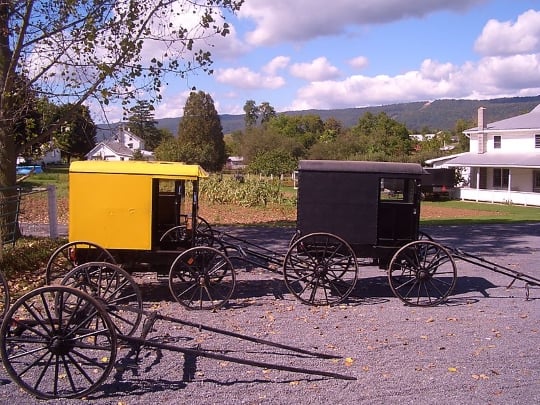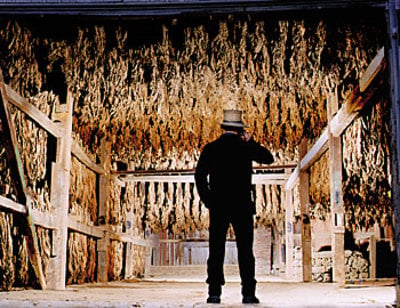Amish Women & Gender Roles
How do roles and expectations of women differ in Amish and non-Amish society? Serving the Amish author Jim Cates explores the question of gender roles in this first of a three-part look at the Amish and women’s issues.
A Natural Woman
When Aretha Franklin crooned “You make me feel like a natural woman” she was thanking the man who fulfilled her, and not a way of life. Still, for those Amish women who embrace their role as a female in the community, the sentiment may fall close to the mark.
“Gender roles” in the larger culture are a paradox. On the one hand, we are approaching a “don’t ask, don’t tell” attitude. The idea that women share equality with men is a hard fought battle. Therefore, any statement that presumes women are different from men runs the risk of igniting a confrontation.
And yet in many of our chauvinistic hearts, men still say “Vive la diffėrence.”
The porn industry, heavily weighted toward men, is one example (however tawdry) of the differences that still exist. And studies continue to demonstrate that at least the manner in which women nurture children is far different. Studies of what men and women want from long-term relationships further highlight distinctions rather than similarities between the sexes.

Obviously, none of this suggests that women should be paid less for completing the same work as men, or face discrimination in employment because of their gender. Nevertheless, our effort to overlook gender uniqueness sometimes places a strain on our logic that defies – well, logic.
And let me insert a disclaimer before I go farther. I was born male, have lived my life male, and have every intention of dying that way. That irretrievably skews my perception of women’s issues. If I did not recognize this fact myself, my wife would help me, sometimes gently, sometimes with vigor. I welcome any and all comments, and do not hold myself out as an “expert” in the field of women’s studies.
That said, we know that the Amish are not immune to change. Rather, they carefully weigh the benefits and risks of any modification, may allow experimentation, and eventually rule on the advisability of modifying the Ordnung. As gender roles, and the very concept of gender within marriage, morphs in the 21st century, how do the Amish respond?
Feminism & Change
Consider the social forces that drive the current wave of feminism in this country. Their origins are too complex to consider in detail here, but a focal point was World War II. “Rosie the Riveter” was more than a caricature. She was the embodiment of women who entered the workforce, filling the roles of men who emptied out industry to fight.
Not only did they enter the workforce. They performed admirably. When the war ended and the soldiers returned home, many of these women gave up their jobs, but not the awareness that they could work alongside men. The genie was loosed from the bottle.
The 1950s may not have seemed a time in which the gender equality rebellion fomented, but a baby boomer daughter sat at her mother’s knee and learned that there was more to life than baking pies and raising children. By the 1960s the backlash was in full swing, and has not stopped to this day. Women’s equality found a new zest for life, and has held on tenaciously since, as women enter the higher echelons of education and the workforce at an ever-increasing rate.

The role of women changed because society changed. War (among many other factors) necessitated it, and the culture slowly, clunkily, is making the adjustment across the years. Amish women, in contrast, shared a pacifist approach to the war with their fathers, brothers, and husbands. The wave of egalitarianism that was sweeping the country did not wash over them, simply because they were not in its path. As a result, their gender roles remain much more fixed in a tradition that is now out of step with the larger culture.
And how do we respond to this separation of gender expectations? We are, after all, acculturated to believe that the “traditional” role for women is in some way “less than” the traditional role accorded to men. We are surrounded by reminders that this is the case, in the books we read, the advertisements that bombard us, and most certainly in the television shows and movies we watch. Before we consider how the Amish handle their acculturation then, how do we handle our perception of their acculturation?
Emotion & Perception
Consider a parallel issue for a moment. Any Old Order settlement will forbid the operation of motorized vehicles for transportation. That is an essential component of the Ordnung.
Many of us understand that by limiting the use of motor vehicles, and requiring that such transportation for longer distances be rented, settlements encourage cohesion and limited interaction with the world. Many of us have also, at one time or another, finagled a ride in a buggy (not just a “tourist” buggy – a “real” ride) to say we have had the experience. We harbor no ill will because they choose to drive buggies rather than cars.

The use of buggies does not strike us as a personal issue (perhaps a car dealer will respond differently!). When we see an Amish woman engaged in hanging wash or caring for children, we think of ourselves, or if we are male, our wives, sisters, or daughters.
There is an emotional connotation to the experience that the buggy lacks. And yet both are expressions of the culture, and the effort to distance themselves from the world, living as they believe Christ has called them to live. When beliefs that fail to strike that spark run counter to ours, we give them little thought.
However, when our emotions are jogged, we find ourselves restless and confused. In the next blog, I consider some of the reasons that a more traditional role for women works well in Amish culture, despite our potential reservations.
Jim is the author of Serving the Amish: A Cultural Guide for Professionals. He can be contacted through this blog or his website at servingtheamish.net.
Above images by ShipshewanaIndiana







Amish Women & Gender Roles
It’s unfortunate that so many in our western culture think that a woman can’t possibly be happy staying at home instead of running the ‘rat race’. I have been a stay-at-home wife for 10 years now. It’s only difficult for me when, like now, we have weeks of snow that prevent me from running errands during the day. Seeing the joy on my husband’s face when he comes home to a warm, tidy home with a hot meal brings me joy. I have things that the Lord has given me to do, art is the main gift. But they never interfere with the marriage covenant. I prayed for 36 years for a husband. Now that he is in my life, why would I want to work hard to make another person (my employer) happier than I want to make my husband and our home life? Women give to much of themselves in the wrong directions these days. Nothing I can do in the world is more important than creating a happy home life for my husband and I to enjoy together. Life outside our walls can be harsh and violent. Life inside our home is rather ‘Hobbit’ like. Warm, dry with plenty of hot food, comfort and joy.
Biblical gender roles
If the Amish were to lose their God-ordered gender roles, I believe they would cease to be Amish. The Bible very clearly lays out separate but equal roles for men and women. Men fill public leadership roles, women work quietly behind the scenes as caretakers and nurturers.
“A woman shall not wear man’s clothing, nor shall a man put on a woman’s clothing; for whoever does these things is an abomination to the LORD your God.” Deuteronomy 22:5
“The aged women likewise, that they be in behavior as becometh holiness, not false accusers, not given to much wine, teachers of good things; that they may teach the young women to be sober, to love their husbands, to love their children, to be discreet, chaste, keepers at home, good, obedient to their own husbands, that the word of God be not blasphemed.” Titus 2:3-5
“There is neither Jew nor Greek, there is neither slave nor free, there is no male and female, for you are all one in Christ Jesus.” Gal 3:28
“For in the resurrection they neither marry nor are given in marriage, but are as the angels of God in heaven.” Matthew 22:30
There are so many more verses like these.
In the extremely liberal church that I grew up in, in which women are encouraged to fill public leadership roles, the men slipped away from view, and rarely participated in the church community, while the women controlled all aspects of the culture, both public and private.
Because of this, I view “gender equality” as reverse sexism against men. My husband experiences this on a daily basis in his job as a teacher in a public elementary school.
On the other hand, in our church community that obeys traditional gender roles, there is a beautiful balance between men and women, husbands and wives.
I could go on and on about this!
So I’ll stop. : )
Frankly, I would prefer to read an essay of this title written by an Amish woman. That is one example of the “difference”: No matter how hard a man works to say, “I’m not telling women to stay in their place,” well, the issue of whether he is or is not telling women to stay in their place ends up as the topic of the essay.
Sorry, Jim. No way around it. This one isn’t yours to write.
A thought
I’m reluctant to jump in here, but for a number of reasons I feel obliged. I don’t think Jim will be offended if I agree with you Trish–that if given the choice to have only either a quality article written from an Amish woman’s perspective, or one from Jim on this topic, I’d probably take the Amish writer’s.
However after that, or in lieu of it, I also appreciate reading what a thoughtful outsider might be able to add, even someone outside the group under discussion, even if I might not agree with the person’s perspective.
I was surprised to read your comment to Jim that “this one isn’t yours to write.” About a month ago we had a reader that I felt was trying to discourage comments by or about people of a certain religious denomination. Correct me if I’m wrong, but it feels like you’re doing something similar.
Mainly, I don’t like the idea that one is only entitled to discuss a subject if one is a member of the group in question.
I think we do this all the time, discussing sports even if we’re not on the team, politics even if we’re not up for election, health issues even if it’s not our child afflicted, or the Amish even if we’re not Amish.
It doesn’t make us experts or the final authority, it just means we have a perspective. And it certainly doesn’t mean that someone can speak in the same way or with the same weight as one who is a member of that group. But I think we should be able to at least offer our thoughts.
Otherwise I fear we shut down dialogue and really limit what anyone can discuss.
That said, I take your point about the value of an Amish female writer on this topic. I think Jim makes a valid point about willingness, but even so maybe we can locate an Amish woman willing to write something on this.
Fair enough, Erik. I meant it as “not yours to write, FOR ME.” That is, my personal interest would be in the Amish woman’s perspective. If that’s not available because it’s just not in their priorities, or perhaps if they even consider it inappropriate, then so be it.
That’s fine Trish, well we agree that it would be nice to hear that voice here. We have another post from an Amish writer scheduled for this week, maybe I’ll see if his wife or a sister has an interest in writing? 🙂
To switch subjects for a moment, the Bergholz resentencing news just came out. Mullet’s sentence was reduced from 15 years to 10 years, 9 months. Looks like he’ll be in prison for a while yet. Sentences of the other 7 still imprisoned were reduced as well.
https://amishamerica.com/mullet-sentence-reduced-to-10-years-9-months/
Not Mine To Write
Trish,
Interesting point. Let’s take it at face value for a moment. An Amish woman needs to write this essay. And yet, why would an Amish woman write this essay? The Amish have no particular need to educate those outside the Amish about themselves. They are largely content to remain distant from the world. So if it were left to an Amish woman, she would probably say “It’s unnecessary.”
The other, indirect part of your statement is whether a man can write about a woman. In my opinion I have read some wonderful essays about men – written by women. I do not BEGIN to place anything I write about women in that category. Far from it. Still, I truly believe, just as there is something to be gleaned from reading how different cultures view “us,” there is something to be gleaned from how the other gender views “us.”
Sory, Trish. We have to agree to disagree on this one.
Being single, never married, I have worked most of my life. Some of the women I worked with wanted careers, but some were working not because they wanted to, but because they had to. They were not trying to keep up with the Jones. But the cost of living today is so much higher than it was years ago. Not all men are heads of companies and pulling in the big money. Some are factory workers, farmers, etc. and I am not putting them down, we need them, but they are not making money enough to keep up with the costs of today. They may be putting in all the hours plus any overtime and still their pay doesn’t meet up with expenses of today.
i grew up during the 50’s and 60’s and my Mother was a stay at home Mom. She only started working when I was in high school and because my Dad opened his business in our home where she could work and still be home when I got home from school. But in cases today, times have changed.
Even some Amish and Mennonite ladies are opening cottages – small stores at their homes. Not just roadside stands. I think things have pressured them like us.
Trish, I, too would like to see an Amish woman’s commentary on this issue. It’s like childbirth…men can “participate” in various ways, as doctors, coaches, partners…but to know the reality of it, you have to be a woman going through it (since men are not equipped to get pregnant & give birth).
I was an “at home” Mom for many years, and for the most part, enjoyed it. But I did find my “work” (housework, cooking, laundry, child-rearing, etc.) wasn’t as respected as that of my husband’s. I didn’t “make money” or earn a pension (which would have certainly helped me NOW…still needing to work…a “paying” job…for a few more years until I can get “full” Soc.. Security and finally “retire” like my husband did several years ago).
I do look forward to doing more “woman-oriented” things In retirement—helping my daughter with her 2 young daughters, hanging out the wash, which I haven’t done in years…(but find it therapeutic as well as “green”), gardening, keeping house, possibly sewing (as my palsied hand allows).
Unfortunately, looking around the world today, it’s still a “man’s world”. It’s “men’s” religions (or interpretations thereof) that bully women into covering up in public (burkas, veils, scarves…even kapps?) and staying “behind the scenes” so as not to interfere with “man’s” world.
I appreciate Amish simplicity, the expected division of male/female work, but to paraphrase the Good Book, “Am I my sister’s keeper?”
Alice Mary
Head covering equals oppression?
Alice Mary, regarding the women’s head covering (maybe this is too much of a bunny trail for this discussion); the clearest explanation I have heard for the role of the head covering is a demonstration that as men and women, we demonstrate that God receives the glory (men’s heads uncovered) and man hides his own glory (women’s heads covered). Like I said in my earlier comment, separate but equal, because men and women are corporately glorifying God and covering man. Interesting that in the Old Testament, male Jews covered their heads, so covered Christian women were assuming a new, counter-cultural role that had traditionally belonged to men. It took Satan almost two thousand years to convince women that by covering their glory they were somehow being oppressed.
Alice Mary, I find the sentence “my work wasn’t as respected as my husband’s” interesting. I guess I’m used to thinking of my wife as the keeper of the home and see her work as what really counts. I bring home the paycheck (more on that later) but SHE is the one that makes our lives run. I have a lot of respect for what she does!
Someone mentioned cottage industry or sidelines. My wife has run a business out of our home for several years. Though I am not involved in it in the sense I make decisions or do book-work or whatever, there are times she asks me to pitch in with the business or times I take up the loose ends by covering some of her planned or usual tasks to leave her free for business. My respect for what she does — running our home AND a profitable business (sometimes her income is more than mine) is high. She keeps a separate business account and personal money, like I do, and we have a joint household account.
I can easily understand how this would be more helpful if an Amish woman wrote it, but I’m also imagining my wife’s response if I asked her to write this. “I have better things to do!” 🙂
Just now it comes to mind how I once heard a wedding sermon in which the bishop pointed out not just “the hand that rocks the cradle rules the world” thought, but how the mother is so much the true heart of the home that what is the first question anyone asks upon coming home? Where is Mom? Just a thought…
Well.. I enjoyed today’s post.. and Im looking forward to the next ones as well.
” I don’t like the idea that one is only entitled to discuss a subject if one is a member of the group in question.”
So very true and who here never talked about anything they werent involved in.. haha.. I know I have.. and often! Im terribly opinionated, but I love hearing others opinions on every subject imaginable.. including this one. This entire blog would be out on its toes if we didnt.
I think there are many women,myself included, who dont mind the traditional roles as long as they have a man who also is fulfilling a traditional role.
The rub comes in when a woman has to fulfill both roles with very little or no support from their mate. or when their mate is a dead beat and out for a free ride on their back. (yes, been there, done that.. it wasnt fun at all.)
Women CAN do it all.. but most of us dont really want to. I dont really know anyone who wants to do it all.. male or female. I had to fulfill both roles for quite a lot of years.. thankfully the toughest part of that is long over.
If all I had to do in my role was clean, cook, watch the babies, sew, garden, meet with other women (& families) for spiritual and community works, I’d love it.. but thats me..
Everyone is entitled to their own likes & dislikes.. those are/were mine.
Personally, my favorite idea of gender roles is where each partner lends a helping hand (as Mark does with his wife) when and where needed. If Dad needs to watch the kiddies while Mom does something else.. thats great.. If Mom needs to give Dad a hand in the field or milking cows, thats great too..
That is what its all about.. helping each other with the tasks that we share in life..
One last tidbit…
I just got home from my twice monthly run to pick up chicken and goat feed in our nearby Amish community. While there I went to a small craft store to pick up a new wooden cutting board. I learned that the sole proprietor is a 28 year old, unmarried lady. She owns the craft store, and the attached machine shop in which she makes all the wood crafts sold in the store. She does beautiful work!
I also know of an elderly Amish lady who repairs propane stoves for a hobby.
I doubt either of these ladies feels much need to be “saved” by women’s lib.
On Women's Roles
Nice to hear of your experiences and this was an interesting piece of writing.
I grew up with a (rare!) stay-at-home Mom, at one time, in a class of 30, I was the only child whose mother did not work outside the home and I was looked down on for that.
But maybe that helped give me my appreciation for the important thing and roles women can play at home and in their families’ lives, if they have the chance.
I always wanted a life like that, but for me, it’s too late: I’m 35, unmarried, and able to have children only if I adopt or have step-children. At one time I was a sincere “seeker” among the Amish, first living a plain life in the Society of Friends. Do you know why I gave up? Although God’s never stopped calling, I realized that I simply couldn’t fit into the culture. A woman, too old to marry, (who no one would want to marry because of the children issue, children being so important in that culture and religion), with no practical skills to support myself alone in even a New Order or liberal Old Order Amish community.
The best I can do is pass the years in a job I’m capable of even if I don’t enjoy it, be grateful for the pay, and emulate my mother and the role she played in my life best I can, alone. Simple things like drying clothes on a lines or keeping a clean home are comforting. Once I wished to be in a situation where a husband and I could live and compliment each other. But I guess God has different plans for everyone! But I think women — some anyway — can be quite happy in a “traditional” role…others, not so much.
Sara, I feel for you. At the same time, there are many single women in our communities. They are sometimes called Single-Sisters, sometimes Old-Maids, sometimes Leftover-Blessings. Some are single by their own choice, some because they were never asked, some because they “lost” that special someone. The single sisters have a part in our community just like anyone else. Some of our close friends are single men or women. I never saw them as “less” than those who married. I’ve heard a lot of discussion on the pros & cons of each and realize it is often, but not always, a choice. At the same time, I realize some will find it harder to accept than others. One of our friends found it hard to see all her sisters marry & settle down with families but eventually not only accepted it but came to rejoice that her singlehood makes it possible to enjoy her nieces & nephews while enjoying the freedom to travel and pursue hobbies. Eventually she was asked by a nice older boy and she finally realized she likes her life as it is and she said “No thank you.”
As for supporting yourself — I am not aware of any who cannot. Jobs for single women range from the predictable teacher, seamstress, house-cleaner, care-giver, waitress, store clerk, or baker to the less “assumed” tour-bus-guide (a few specialize in long-distance trips like Alaska or Florida and are gone weeks at a time) to accountant, caterer, one owns an employee leasing company, store owners, retirement home workers, hotel employees, B&B owners, secretaries, some work at printing companies doing editing, layout, photo-shop for advertising, one is the manager of a plumbing supply store, some work in furniture shops as “finishers”, and on and on. At the same time I realize that smaller or very conservative communities WILL have less options.
Though many people who are childless discover this after marrying, I know of some who knew before marriage there was a high chance they would not have children. If the couple truly loves each other, that shouldn’t “call it off.” I personally know a couple where the girl told her boyfriend right up front she would never be able to have children. I’m sure he was disappointed, in fact I know it, but he loved her enough to say that didn’t matter.
Just my two-cents.
Singles
I’d never thought of many of those jobs as a way to support myself, nor really about how a “single sister” could still be valued in a community where I’ve always felt marriage and children were the ultimate goals and ways to be accepted. Most of the jobs you list I’d much prefer to my own. I read a story much like that one in either Family Life or Young Companion once and I admired the woman for becoming so comfortable with where God had placed her in life that she was able to say “no” to the young man who asked her for the date. Her “no” answer sure surprised me though!
I was engaged for three years to a young man who was spiritual, not religious. We had plans to adopt at least one child from the Dominican Republic once we married. And he left me. In the end I feel more comfortable because our faiths did not match, though he was a good man and a kind one. I would rather be single than find myself unhappy in marriage later, which I’ve come to believe is what would have happened.
Your comment to me was like a little ray of light, because I’ve not understood why I’ve never stopped feeling God’s “voice” in wanting to continue seeking a possible life with the Amish. I’ve been fighting against that feeling, thinking I’m misinterpreting how I feel in my heart and misunderstanding what God wants for me. Your comment gave me hope and I thank you.
Sara,
I was 40 when I married my wife, who was 35. We have a daughter, now 10, who we adopted as an infant because we could not have children. She has been a blessing to us, and, were it not for some health issues with my wife and I, we would probably have adopted several more. So don’t give up.
I would encourage you to remain open to whatever God’s plan is for you. At 35, you are still young (at least from my perspective 8)) and there is no telling what the future holds for you. I pray that God will give you grace and comfort you as you wait to see what He has in store for you.
Single, Patience
Thank you Forest for your prayers. I try to listen to God’s guidance but I know I still fight against His will for me sometimes. I try to see ahead or guess and in the end that doesn’t always turn out very well. Thank you for the compliment and for telling me your own story. I’m very glad to hear it and you and your family, as well as Mark and his, will be in mine. Thank you, again.
To Sara and others
Thank you, Sara and your generous responders, for letting me eavesdrop on your thoughts. I too am a never-married, child-less, happily-single woman though I prefer the English world as I’m a rotten cook and worse housekeeper. 🙂 I so enjoyed reading all of your interaction on this blog. God bless!
Gender roles a mess out there.
I feel that the Amish people have it right.
They follow the way God made it to be. The man works for the family, and the woman nurtures the children and cares for the home.
Todays women don’t seem to have much knowledge at all on what it takes to run a home efficiently and properly.
It is a lost art in the modern world.
There are so many men who would appreciate having a wife who is happy to be at home and caring for him and his families needs.
But modern women seem to just want to have their cake and eat it too.
They have no interest in what their husbands may need.
For todays woman, Its all about them and no one else.
I feel sad for the women of today.
They have lost their way and forgotten what is important in life.
So we end up with neglected husbands, and children who live in day care centres or being raised by someone else, while
the modern mom is out satisfying her own desires.
Julie – I think that’s a HUGE generalization you just made there. I can assure you many, if not the vast majority of women living today would be insulted over your claims that they don’t know how to take care of their households. And since the middle class is shrinking because the huge corporations that don’t pay taxes and pay their workers a pittance while their CEOs are raking in millions — and the gazillionaire 1% who doesn’t share the 50% of this country’s wealth with their workers – women are forced to go to work because a two-income household is the only way they can stay out of poverty. In fact, Amish women also own businesses as well since they need the money to stay afloat with all those children.
I’m sorry to say your comment seems a tad ill-informed and prejudiced against the lower middle class.
I appreciate the perspective that Jim Cates brings here. I don’t think his gender or non-Amish status (for lack of a better term) invalidates his opinion or his right to express it. I think his comparison of the gender-issue to a practically non-existent “buggy-issue” illustrates his point about about emotion and perception quite effectively. This is a complex topic in our society, and all opinions are welcome.
Here’s a somewhat-related comic that always makes me giggle:
https://beingsakin.files.wordpress.com/2011/08/fashion.jpg
It seems to me — and my experience is limited — that women’s roles are valued much more highly in Amish culture than in “English” culture. There seems to be a genuine, widespread belief that being a keeper of the home is as important as any of the men’s roles. However, in English culture, traditional women’s roles are considered inferior and even demeaning, not something to aspire to do.
I suppose one could say that in Amish culture, women’s roles consist mainly of things that women (supposedly) on average, do better than men; while in English culture, women’s roles consist mainly of things that men do, except that men are perceived as doing them “better”. (There are exceptions, of course.) In that sense, in a strange way, Amish culture seems to be more gender-equal than contemporary English culture.
I'm perplexed...
The occupation as homemaker is certainly honored and extolled by the “English” contemporary culture amongst Feminists. The feminist magazines, Ms., along with the National Organization for Women (NOW Magazine), and Mother Jones as well as mainstream news outlets such as the New York Times, Newsweek, Time magazine – all have done multiple very long, featured on the cover, extremely in depth articles about the huge worth, (both fiscally as well as the value to society), the occupation of homemaker is to the United States of America as well as globally. Feminist organizations and PACs have been lobbying for at least a decade for stay at home Moms to receive tax incentives, paid maternity leave, and the recognition that Mothers who stay home to care for children would be paid close to $100,000 a year for their services to their family if they were contracted out.
Every woman that I know who is a stay at home mom, has said they have never encountered any dishonor or prejudice in their lives for being a homemaker. Not one person has said they felt demeaned or inferior for staying at home. And these women left careers to take care of their children. All of them have said their co-workers were happy for them when they chose to be homemakers.
I know that perhaps the media or feminist-haters like to portray the opposite – but that is simply not true in reality. Feminists are the biggest supporters of stay at home Moms. However the Republican Party has consistently voted against maternity leave, paternity leave, or even tax incentives for stay at home moms.
Have you encountered demeaning and insulting bullying for being a stay at home Mom? Because that’s actually very rare in today’s culture and it is not the current reality.
Bullying...Rare?
My question in response, Judith – in your own comment, you state “…the Republican Party has consistently voted against maternity leave, paternity leave, or even tax incentives for stay at home moms.” Then you say demeaning, insulting, and bullying behavior is actually very rare in today’s culture for being a stay at home mom. Your perspectives – not mine. Still, I would see a major political party refusing to acknowledge the worth of stay at home parenting as demeaning.